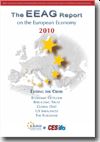This report was sent to me yesterday by IESE Insight. I wanted to share it with you.
Road to Recovery Requires Rebuilding Trust
Vives Torrents, Xavier; European Economics Advisory Group (EEAG)

Publisher: CESifo
Original document: The EEAG Report on the European Economy 2010
Year: 2010
Language: English
While acknowledging signs of recovery after the intense economic recession of 2008-2009, the 2010 report of the European Economic Advisory Group (EEAG) warns that we are not out of the woods yet. Several factors may damper any recovery, and the report outlines major challenges still to come.
The authors, including IESE’s Prof. Xavier Vives, suggest that the restructuring process of the banking system, for example, is far from over. This may result in credit constraints and a reluctance to extend loans. Other hurdles include a slack in capital utilization, and a tense and possibly deteriorating labor market, which could lead to a decrease in private consumption.
But all is not lost. The authors predict that emerging economies should see more favorable economic conditions, becoming the growth engines of the global economy. And GDP, though remaining subpar, will go up by 2.3 in 2010, they say.
Macroeconomic Conditions
In the United States, the recession has, according to the report, officially come to an end. The strongest negative growth contribution in 2009 came from investment, and there was a sharp fall in demand for foreign goods. However, the decline in exports was less obvious, enabling the trade balance to improve significantly. Furthermore, in mid-2009, real-estate prices ended their freefall. The authors attribute this to the enormous subsidies and tax reliefs granted by the U.S. government.
In Europe, all member countries, with the exception of Poland, suffered the effects of a deep recession. Recovery in Europe began in the second half of 2009, with the exception of Cyprus, Greece, Spain and the United Kingdom, which were still in recession in the third quarter of 2009. Although the prospects of firms have improved, problems with the banking sector remain, which may hinder a strong recovery in investment.
Japan, the hardest-hit major world economy, began its recovery in the second quarter of 2009, with the most important drivers – foreign trade and private consumption – leading the way. However, the annual growth rate for 2009 still fell, and long-term prospects are bleak.
In China, meanwhile, things are looking up. The country has been able to recover to pre-crisis growth levels, and short-term economic prospects remain positive.
Rebuilding Trust
While some policies have been successful in preventing another Great Depression, recovery remains fragile. One reason for this, according to the authors, is the collapse of trust toward financial intermediaries, bankers and financial markets. The report takes a look at the adverse effects the crisis has had on trust in financial markets, and analyzes whether the financial sector will be able to resume its activity at the pre-crisis level.
The fall in trust, largely provoked by opportunistic behavior, will most likely result in a drop in investment in risky assets and in the demand for complex financial instruments with ambiguous returns, less diversified portfolios and less reliance on intermediaries. In their chapter on building trust, the authors outline two avenues: enhanced regulation and industry reaction.
The authors argue that financial regulation may affect the perceived solvency of the intermediaries, but is likely to have little impact on trust. The most relevant proposal to recover trust, according to the report, is the creation of a consumer protection agency proposed by the Obama Administration, and the creation in the United States of a Financial Fraud Enforcement Task Force.
The alternative strategy relies on the intermediaries themselves to rebuild their reputation. The authors suggest some possible ways to do this.
Implement a rating system for intermediaries. An easily understandable rating system, from zero to 10, would grade intermediaries on their ability to offer trustworthy services, reducing the scope for opportunistic behavior and giving intermediaries incentives to increase their trustworthiness.
Create a trust-based compensation scheme. Providing incentives by compensating the investor’s manager would promote trustworthy behavior and increase investor trust and their willingness to invest.
Promote financial education. Taking action to educate investors, whether through financial education in public schools or third-party educational materials, would help investors avoid falling victim to financial abuses.
The 2010 report also includes a chapter analyzing the large deficits of major developed countries, as well as an analysis of the impact of the crisis on the U.S. economy and the euro zone, using Greece as a case in point.
In our country, I think that trust rebuilding by Banks and Savings Bank will require a firm behaviour by them for the honouring of Bank Guarantees of Law 57/68 and the commitment to meet the risponsability stablished in provision 1.2 of Law 57/68 if Guarantees were not in place.